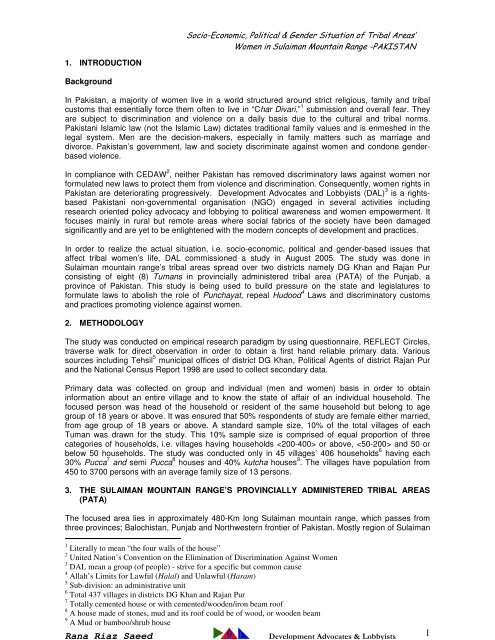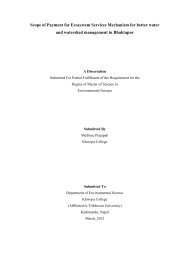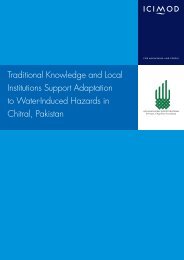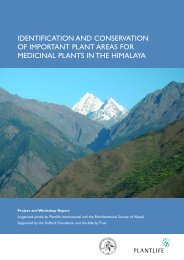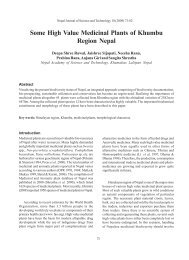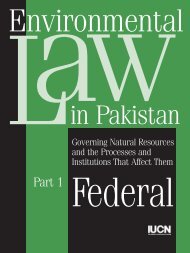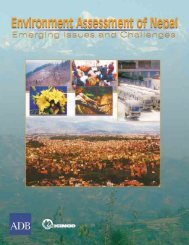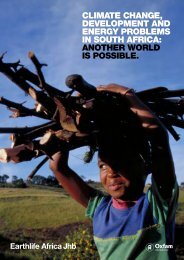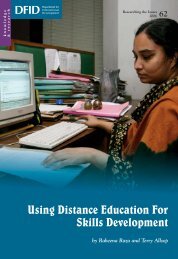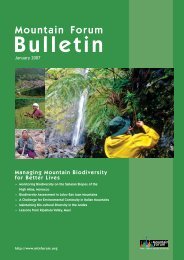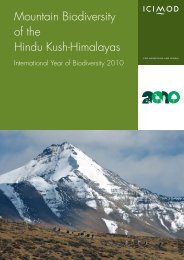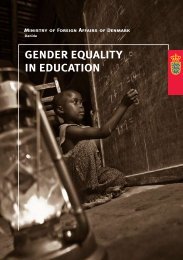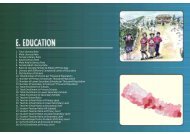Rana Riaz Saeed 1 - ResearchGate
Rana Riaz Saeed 1 - ResearchGate
Rana Riaz Saeed 1 - ResearchGate
You also want an ePaper? Increase the reach of your titles
YUMPU automatically turns print PDFs into web optimized ePapers that Google loves.
Socio-Economic, Political & Gender Situation of Tribal Areas’<br />
Women in Sulaiman Mountain Range -PAKISTAN<br />
1. INTRODUCTION<br />
Background<br />
In Pakistan, a majority of women live in a world structured around strict religious, family and tribal<br />
customs that essentially force them often to live in “Char Divari,” 1 submission and overall fear. They<br />
are subject to discrimination and violence on a daily basis due to the cultural and tribal norms.<br />
Pakistani Islamic law (not the Islamic Law) dictates traditional family values and is enmeshed in the<br />
legal system. Men are the decision-makers, especially in family matters such as marriage and<br />
divorce. Pakistan’s government, law and society discriminate against women and condone genderbased<br />
violence.<br />
In compliance with CEDAW 2 , neither Pakistan has removed discriminatory laws against women nor<br />
formulated new laws to protect them from violence and discrimination. Consequently, women rights in<br />
Pakistan are deteriorating progressively. Development Advocates and Lobbyists (DAL) 3 is a rightsbased<br />
Pakistani non-governmental organisation (NGO) engaged in several activities including<br />
research oriented policy advocacy and lobbying to political awareness and women empowerment. It<br />
focuses mainly in rural but remote areas where social fabrics of the society have been damaged<br />
significantly and are yet to be enlightened with the modern concepts of development and practices.<br />
In order to realize the actual situation, i.e. socio-economic, political and gender-based issues that<br />
affect tribal women’s life, DAL commissioned a study in August 2005. The study was done in<br />
Sulaiman mountain range’s tribal areas spread over two districts namely DG Khan and Rajan Pur<br />
consisting of eight (8) Tumans in provincially administered tribal area (PATA) of the Punjab, a<br />
province of Pakistan. This study is being used to build pressure on the state and legislatures to<br />
formulate laws to abolish the role of Punchayat, repeal Hudood 4 Laws and discriminatory customs<br />
and practices promoting violence against women.<br />
2. METHODOLOGY<br />
The study was conducted on empirical research paradigm by using questionnaire, REFLECT Circles,<br />
traverse walk for direct observation in order to obtain a first hand reliable primary data. Various<br />
sources including Tehsil 5 municipal offices of district DG Khan, Political Agents of district Rajan Pur<br />
and the National Census Report 1998 are used to collect secondary data.<br />
Primary data was collected on group and individual (men and women) basis in order to obtain<br />
information about an entire village and to know the state of affair of an individual household. The<br />
focused person was head of the household or resident of the same household but belong to age<br />
group of 18 years or above. It was ensured that 50% respondents of study are female either married,<br />
from age group of 18 years or above. A standard sample size, 10% of the total villages of each<br />
Tuman was drawn for the study. This 10% sample size is comprised of equal proportion of three<br />
categories of households, i.e. villages having households or above, and 50 or<br />
below 50 households. The study was conducted only in 45 villages’ 406 households 6 having each<br />
30% Pucca 7 and semi Pucca 8 houses and 40% kutcha houses 9 . The villages have population from<br />
450 to 3700 persons with an average family size of 13 persons.<br />
3. THE SULAIMAN MOUNTAIN RANGE’S PROVINCIALLY ADMINISTERED TRIBAL AREAS<br />
(PATA)<br />
The focused area lies in approximately 480-Km long Sulaiman mountain range, which passes from<br />
three provinces; Balochistan, Punjab and Northwestern frontier of Pakistan. Mostly region of Sulaiman<br />
1 Literally to mean “the four walls of the house”<br />
2 United Nation’s Convention on the Elimination of Discrimination Against Women<br />
3 DAL mean a group (of people) - strive for a specific but common cause<br />
4 Allah’s Limits for Lawful (Halal) and Unlawful (Haram)<br />
5 Sub-division: an administrative unit<br />
6 Total 437 villages in districts DG Khan and Rajan Pur<br />
7 Totally cemented house or with cemented/wooden/iron beam roof<br />
8 A house made of stones, mud and its roof could be of wood, or wooden beam<br />
9 A Mud or bamboo/shrub house<br />
<strong>Rana</strong> <strong>Riaz</strong> <strong>Saeed</strong> Development Advocates & Lobbyists 1
Socio-Economic, Political & Gender Situation of Tribal Areas’<br />
Women in Sulaiman Mountain Range -PAKISTAN<br />
range is 500 meters above the sea level, having famous high points such as Takhat-I-Sulaiman<br />
(3383m) and Fort Minro (1950 m), 10 which form PATA, commonly known as the de-excluded area. In<br />
the Punjab, the Sulaiman range passes from two districts Dera Ghazi Khan (DG Khan) and Rajan<br />
Pur. Majority of the inhabitants is from different Baloch tribes living here since several centuries and<br />
identify themselves by sub-tribes name. However, owing to lack of education among them, no history<br />
of their influx in these hills seems to have been recorded so far.<br />
In 1880, the British government in India occupied Balochistan and declared the Sulaiman mountain<br />
range area of DG Khan as tribal area and placed under direct control of the Governor General of<br />
India. The Governor General introduced Tumandara System and administrated it as a special area<br />
through various Tumandars 11 under Patron-Client relationship. The main tribes have been living<br />
included Mazari, Dareshik, Laghari, Easai, Khosa, Buzdar, Lund, Gorchani and Khetran. Each tribe<br />
had constituted a Tuman and its chief called “Tumandar” with first class magisterial powers to decide<br />
civil and criminal cases under the Frontier Crime Regulations (FCR).<br />
After the independence in 1947, these powers were withdrawn from the Tumandars. Subsequently,<br />
one Political Tehsildar 12 and three Political Naib Tehsildars were appointed to administer justice to the<br />
public. This also meant a step towards the freedom of Baloch people who were under the yoke of this<br />
age long dictatorial system. But, for the practical purpose this arrangement brought no change in the<br />
administration of the area. Again in 1950, the special area was declared as “de-excluded area” of DG<br />
Khan district. Unfortunately, things continued to happen without any substantial change and Jirgas<br />
continued in the same manner. Now, the Jirgas were presided over by the Naib Tehsildars instead of<br />
Tumandars. In theory, this step meant to do away with the individual influence of Tumandars, which<br />
they wielded over their tribes during British rule to facilitate mutual interests of the British government<br />
and themselves.<br />
In 1959, General Ayub Khan, former President of Pakistan (1958-1969) introduced the Basic<br />
Democracies System, and people of this area had also given a chance of electing their<br />
representatives. Owing to the social, cultural and economic infrastructure however, they had no<br />
choice but to elect same Tumandars and the influentials who neither had willingness nor potential to<br />
improve the lot of a common person. With the introduction of local government system by successive<br />
regimes in Pakistan, the administrative set up of the area has undergone some changes. Yet, the<br />
system has not been successful to challenge the monopoly and hegemony of the influentials, Sardar<br />
(tribal chiefs) and Wodera (feudals). Before the present set up of local government (2001), tribal area<br />
of DG Khan was under the administration of Union Councils and Fort Minro was the largest Union<br />
Council of tribal area. Under the new system, a Tehsil Council has been established. Presently, the<br />
Tribal areas falling in Tehsil DG Khan and Taunsa are combined to constitute a single Tehsil Council<br />
consisting of five Union Councils namely Tuman Laghari, Mubarki, Barthi, Kach and Tibbi Qaisrani<br />
stretching over to an area of 4000 Sq. Km with a population about 0.16 million.<br />
The tribal areas of Sulaiman range falling in district Rajan Pur have almost the same history and<br />
backgrounds like district DG Khan. Till June 1982, this tribal area was a part of district DG Khan.<br />
Having created Rajan Pur as a new district, it is comprised of Rajan Pur subdivision, Rojhan<br />
subdivision, Jam Pur subdivision and the de-excluded area are situated in these subdivisions consists<br />
of three Tumans namely Tuman Mazari, Gorchani and Dareshik covering an area of 4969, 8896 and<br />
632 acres respectively. These Tumans having an estimated total population about 0.1 million. The<br />
biggest Tuman is Gorchani (35 villages) and the smallest is Dareshik (17 villages). After the<br />
termination of Tumandari System, now the Border Military Police (BMP) administers this area with the<br />
help of Political Assistant.<br />
4. SOCIAL SITUATION AND STATUS<br />
In the entire tribal area of Sulaiman range, people live and marry on tribal basis. Every tribe has subtribe<br />
and normally does not interact with each other however, with few exceptions. For instance, in<br />
Tuman Buzdar, Jehanani tribe is considered chief of the Tuman, which has five branches or subtribes.<br />
Almost in similar way, the tribes in other Tuman live and interact. The men informed that the<br />
10 The New Oxford Atlas for Pakistan: Oxford University Press-1998<br />
11 Revenue Collection agent – in Persian<br />
12 Sub-division Officer<br />
<strong>Rana</strong> <strong>Riaz</strong> <strong>Saeed</strong> Development Advocates & Lobbyists 2
Socio-Economic, Political & Gender Situation of Tribal Areas’<br />
Women in Sulaiman Mountain Range -PAKISTAN<br />
Buzdar tribe was settled here almost 500 years ago at the time of Mir Chakar Khan Rind. The general<br />
social situation of women in the Sulaiman mountain range tribal area is as followed.<br />
Education<br />
Education is the most important factor in a study to determine the level of perception of a person or<br />
community about any issue. Therefore, information reveals that primary level (5 th Grade) educational<br />
facilities are available in 50% of the villages only. The 8 th Grade education facilities are available in<br />
20% villages, 13% villages have up to 10 th Grade, whereas in 17% villages the educational facilities<br />
are non existent at all. Only in 30% villages primary level educational facilities are available for women<br />
with an exception of 2 villages namely village Khar of Tuman Laghari and village Methawan of Tuman<br />
Qaisrani where women secondary schools are instituted.<br />
The education level of respondents was also obtained during the study. However, less respondents,<br />
in total 449 wherein 191 female, informed about their education. The comparison is given in the table<br />
below.<br />
Comparison of Male-Female Education Level<br />
Education Level<br />
Gender<br />
Female Male<br />
Percent Percent<br />
Illiterate 85% 46%<br />
Grade-5 13% 17%<br />
Grade-8 2% 16%<br />
Matric or Secondary Grade-10 0% 13%<br />
Higher Secondary 0% 4%<br />
Graduate 0% 2%<br />
Post Graduate 0% 3%<br />
Total 100% 100%<br />
Source: DAL Study on Situation of Tribal Areas’ Women of Sulaiman Range -2006<br />
With regard to educational level of respondents, 85% women as compared to 46% men are illiterate.<br />
Only 13% women have passed primary i.e. Grade 5 against 17% men. Just about 2% women have<br />
passed their Grade 8 level examination as compared to 16% men. Unfortunately, no woman has<br />
reached or ever attended 10 th grade level of her education.<br />
Since the tribal area is hilly, remote and local women are not educated adequately; therefore female<br />
staff is recruited from urban areas. The staff for many reasons such as social order, Feudal-Sardari<br />
system and lack of transport facilities has least interest in their jobs. Consequently, the schools are<br />
either operative poorly or non-operative. In given situation, the locals depend on Masjid Schools 13 ,<br />
which is one of the main reasons for the under development and poverty in the area.<br />
There are several reasons of low educational level among women given by the people. Mainly,<br />
because the non-availability of educational facilities for women in mostly villages of Sulaiman range<br />
TA. Women are unable to get education beyond 5 th Grade as no higher school facilities exist in the<br />
vicinity or are far away and outside the village. In such situation, the tribal customs do not allow<br />
women to go far away or outside the village for education purpose. Lack of enough resources to<br />
educate girls is another factor. Likewise, initially women education was not considered good and on<br />
priority because it was considered investment on other. There was no use of that money to her family<br />
rather to other family where she marries. The son is considered to be a supportive in older age but<br />
now some educated families do it. Furthermore, having realized that the daughters of feudal are<br />
getting education abroad, now we have started to educate our girls, a man explained.<br />
An educated woman expressed that education opportunity is not provided to woman though a woman<br />
education is considered … education of a family and a man education of an individual. She suggested<br />
that women should focus on education to bring change in society, peace and democracy in our area<br />
and the country. However, a Tehsil Nazim (men) said that educated women give proper attention to<br />
13 Mosque School<br />
<strong>Rana</strong> <strong>Riaz</strong> <strong>Saeed</strong> Development Advocates & Lobbyists 3
Socio-Economic, Political & Gender Situation of Tribal Areas’<br />
Women in Sulaiman Mountain Range -PAKISTAN<br />
home and children. But he proposed that women might be provided religious education only. It is not<br />
necessary that woman do work after education because they up-bring their children.<br />
It is significant to mention here that in village Gulkhanani Kalat the first primary school was<br />
established in 1926 by the British government and upgraded in 1935 for Grade-8 level education. In<br />
1954, a new building was constructed that caters the purpose of high secondary school of the village.<br />
There are now four government schools and a private English medium school in village Barthi.<br />
Health<br />
The tribal area people of Sulaiman range are very unfortunate in availability of health facilities<br />
because, only 4% of the villages have basic health centers or dispensaries. But, there is no female<br />
doctor or paramedical staff available in the centers consequently women suffers a lot in case of<br />
complication, particularly at the time of pregnancy or delivery. The locals of villages resort to home<br />
treatment based on superstitions and tips. Quacks are common, as a result people don’t get proper<br />
treatment and are suffering from fatal diseases. Due to non-availability of maternity home, child<br />
delivery is done at home with the help of female birth attendant which might not be a properly trained<br />
birth attendant. Therefore, infant and maternal mortality rate is quite high than the national average.<br />
The area is hilly, remote, poor and the non-availability of transport bring further misery to the life of<br />
patients. During the study, it was identified that because almost every household has cattle farming on<br />
small scale, therefore they need veterinary hospitals as well.<br />
Water-Sanitation and Other Facilities<br />
Proper drinking water supply is available only in 20% villages, while in remaining villages people use<br />
water flowing from Chashmas (springs) or use polluted water stored in pools and Johars (ponds)<br />
whereas the same pools and Johars are used by animals for drinking water. These resources also<br />
become dry during summer or when there is no rain or drought. Women are responsible to fetch water<br />
from these springs or ponds, which are normally available in far-flung area from the villages. In few<br />
villages, the local body representatives constructed water supply schemes. However, according to the<br />
communities, the schemes have proven failure as only supply lines are laid-down and the reservoir<br />
tank is abandoned since day one.<br />
Sanitation and sewerage facilities are non-existent in all villages under this study. In few villages<br />
people have constructed open drain channels which however ends to a nearby pond or field, therefore<br />
are caused of serious health and environmental problems for the residents, particularly women and<br />
children. As a result, diseases like typhoid, diarrhea, tuberculoses, Hepatitis B-C, cholera, etc. are<br />
common. There is as such no concepts of toilet or bathroom in almost all villages, except for few<br />
houses belong to wealthy and educated Sardars. People go outside and use open field for toilet<br />
purposes. This act is far problematic for girls and women, as they have to wait for darkness…dawn or<br />
sunset for their toilet needs. This situation for women further aggravates when there is a rain or no<br />
crop in the field.<br />
Electricity is available only in 75% villages of Tuman Qaisrani and 72% villages of Tuman Laghari. To<br />
be precise only 16 villages have electricity, the remaining 29 villages of the rest of Tumans do not<br />
have any such facility. Transport facilities are invariably not available in these villages except a few<br />
which use pickups or animals for transportation while the people of many villages have to travel on<br />
foot for many kilometers to reach such point from where they can get transport to move.<br />
5. CUSTOMS, PRACTICES AND GENDER ISSUES<br />
Culture and tradition are always evolving. Some societies have evolved more then others. Culture is<br />
merely a description of the way that any particular society lives their lives. This is often positive,<br />
sometimes not and always changing and developing. The conventional customs and practices 14 in<br />
under study area are not unusual than what is happening in other parts of the world or the country -<br />
Pakistan.<br />
The communities in all 8 Tumans follow centuries old conventional customs and practice greatly,<br />
which are major causes of gender issues. These customs are followed due to several<br />
14 For definitions and history of the customs and practices please see Annex-1<br />
<strong>Rana</strong> <strong>Riaz</strong> <strong>Saeed</strong> Development Advocates & Lobbyists 4
Socio-Economic, Political & Gender Situation of Tribal Areas’<br />
Women in Sulaiman Mountain Range -PAKISTAN<br />
reasons…Illiteracy, absence of basic infrastructure such as road network, electricity, telephone, etc.<br />
are among few. Invariably every Tuman of Sulaiman range has traditional society governed by a<br />
feudal/ tribal chief without any interference of governmental institutions. Hereinafter, the table shows<br />
that how religiously community follow their customs invented or adopted by their forefathers and<br />
brings misery in women life.<br />
Conventional Customs Practice in Villages of Sulaiman Range<br />
Type of Conventional Practice Percentage<br />
Aaf and Aas-Crossing Fire barefoot 3%<br />
Divorce 3%<br />
Domestic Violence 27%<br />
Dowry 0%<br />
Early age Marriages 10%<br />
Honour Killings 27%<br />
Karo-Kari 73%<br />
Marriage to Quran 27%<br />
Punchaiyat 40%<br />
Rape 3%<br />
Sale and purchase of Women 23%<br />
Share to women in inherited property 7%<br />
Vani 30%<br />
Watta & Takka (Numrad) 7%<br />
Watta-Satta 67%<br />
Source: DAL Study on Situation of Tribal Areas’ Women of Sulaiman Range -2006<br />
The customs of Watta-Satta, Vani, Karo-Kari, honor killing, marriage with Quran…the Holy book of<br />
Muslims, early age marriages within close family are in practice without any exception. Interestingly,<br />
divorce is very uncommon in the area. Customary practice like Vani or Swara for settling disputes in<br />
exchange of girls and use of girl as compensation for crimes are also reported. It may be important to<br />
mention here that most of these informants were female.<br />
Early Age or Child Marriages<br />
In the area, marriage at a very young age is reported in 10% villages. The reasons included religion,<br />
poverty and economic situation compel them to marry girls in early age. “It is good to marry girls in<br />
early age, otherwise, we poor cannot guard them (from sexual assault)”, informed a woman of the<br />
area”. However, both men and women viewed that girls are married when they reach to the puberty<br />
age so that she could not follow wrong steps or become pregnant outside marriage, otherwise she<br />
could be killed. The benefit of early marriages that the parents seek is they do not need to spend<br />
money on their girl. For instance, if a girl is sick, the expenses are borne by her in laws. This is<br />
perhaps the reason that few people educate their daughters after Grade 5. Another reason is that gifts<br />
of thousands of rupees are received back from relatives and friends. It is hard to know the number of<br />
early marriages, as so many are unregistered and unofficial. Mostly, early marriages are done under<br />
Watta-Satta custom. Here, not only women, also the men cannot marry according to their wishes.<br />
Gender discrimination can also underpin in early marriage. Girls may be married young to ensure<br />
obedience and subservience within their husband’s household and to maximise their childbearing. Girl<br />
gets early marriage cannot be dare enough to speak against early marriage. However, neither she<br />
knows about her responsibilities nor is she capable to perform it. The child marriage is not good as it<br />
creates friction with in laws and the girl cannot talk with them freely.<br />
In the early age marriages, it is a girl, who faces loss and problems including denial of education, as<br />
once married, girl tends not to go to school. Health problems include premature pregnancies, which<br />
cause higher rates of maternal and infant mortality. A child bride can face greater health risks and<br />
experiences real physical violation and trauma as her young body is forced to deal with early sexual<br />
activity and the strains and pains of pregnancy and childbirth. According to a doctor, one of the more<br />
damaging results of early childbearing is vesico-vaginal or recto-vaginal fistulae. This complication,<br />
due to prolonged obstructed birth, leads to loss of full control of urinary and/or rectal functions. Given<br />
their lack of access to health care in tribal areas, mostly girls with this condition are unlikely to receive<br />
proper treatment. Teenage girls are also more vulnerable to sexually transmitted infections, including<br />
<strong>Rana</strong> <strong>Riaz</strong> <strong>Saeed</strong> Development Advocates & Lobbyists 5
Socio-Economic, Political & Gender Situation of Tribal Areas’<br />
Women in Sulaiman Mountain Range -PAKISTAN<br />
HIV/AIDS as many are unable to negotiate for protected sex. Further compounding their vulnerable<br />
position is lack of knowledge of contraceptive methods and lack of access to reproductive health<br />
information and services. Abuse is also common in such child marriages.<br />
In the process of such marriages being arranged by family members, safeguards in the law are often<br />
overlooked and minimum age of marriage and need for mutual consent are not guaranteed, thus<br />
making the marriage a forced one. In 1990, Pakistan ratified the UN Convention on the Rights of<br />
Child, which prohibits child marriages. In addition, under the Muslim Family Law Ordinance, a girl<br />
must have attain the age of 16 and a boy must have attain the age of 18, and both need to consent<br />
before the marriage take place. Historically, there have been no measures taken by the state to<br />
ensure that marriages are consensual and in many instances the age of a girl is misreported on her<br />
marriage certificate in order to avoid questions over her being underage.<br />
Surprisingly, some women support this custom and say that the custom is right and we are not in<br />
favour to abolish it. However, some women proposed that the government should discourage and<br />
penalize early age marriages and Nikah. 15 This penalty should also be put on the Nikah Khawan 16 and<br />
that there is a need to make legislation about it.<br />
The custom of early age marriages is not new in Sulaiman range areas. This has been in practice<br />
since centuries in the subcontinent and the world. Not only common people but also élites and rulers<br />
follow this custom. Arjumand Bano, commonly known as Mumtaz Begum the resident of world’s<br />
seventh wonder Taj Mehal was just 13 years old, when married to Mughal emperor - Shah Jehan,<br />
who was 15 years old. In 1993, Romanian government 17 had opened an inquiry into the marriage of a<br />
gypsy King Florin Cioaba’s daughter Ana-Maria Cioaba age 12 or 14 years who married to her 15-<br />
year-old Roma bridegroom 18 . This is just another example of an “arranged” child marriage. The UK<br />
dispenses birth control and sex education to teenage (in some cases, pre-teenage) girls and equally<br />
popular of supporting under-age sex and abuses own so-called laws and perhaps has the highest rate<br />
of pre-16 pregnancies within the EU.<br />
Mismatch or Marriage of Convenience<br />
During the study, a female participant defines Mismatch Marriage: “if a marriage takes place without<br />
the consent of a girl”. As a matter of fact, it is difficult to define mismatch marriages, which are<br />
common and in practice throughout the world irrespective of their social and economic status and in<br />
every continent. It could be a forced marriage, arranged or love marriage. In mostly cases, the<br />
husband is older than wife is but wealthy and in some, a wife is older than her husband.<br />
There were numerous such examples referred by the people during the study in which a 15 or 20<br />
years old girl or woman was married to a much older man. It, however, could not be ascertained from<br />
the discussions that whether the marriages were forced or with the consent of woman. The marriages,<br />
which do not have consent of the bride or bridegroom, can be assumed as forced marriage otherwise,<br />
it is a marriage of convenience in which either man or woman seeks benefit.<br />
Marriage of convenience is common in other parts of the world. Among such marriages, the famous<br />
one is of Princess Diana with Prince Charles of United Kingdom, when married in 1981, Lady Diana<br />
was only 21 years old and the Prince was 42 years. Similarly, the legendary cricket player Imran Khan<br />
(41) married with Jemima Goldsmith of Briton who was 21 years old when married. Famous<br />
Hollywood actress Elizabeth Taylor, also married with men younger than her. However, the populist<br />
mismatch or marriage of convenience of the last century was between an American oil billionaire,<br />
Howard Marshall II (age 89) and a famous model-cum Hollywood actress Anna Nicole Smith (age 26)<br />
when they got married in 1994.<br />
15 Muslim marriage contract<br />
16 Muslim marriage registrar/contractor<br />
17 The BBC's Robert Nisbet 30 Sep 03<br />
18 The legal minimum age for marriage in Romania is 16<br />
<strong>Rana</strong> <strong>Riaz</strong> <strong>Saeed</strong> Development Advocates & Lobbyists 6
Marriage of Choice - Within Casts<br />
Socio-Economic, Political & Gender Situation of Tribal Areas’<br />
Women in Sulaiman Mountain Range -PAKISTAN<br />
In Pakistan, the most crucial issue for a young man and woman is marrying of his or her choice. The<br />
prevailing customs and practices do not give liberty to most of them to marry at their own. Though,<br />
this varies according to the norms of a family, tribe or casts, but in general people are not willing to<br />
abandon it.<br />
The discussion taken place on this delicate issue with different community of Sulaiman range area,<br />
tribes, cast, age group and gender, whether educated or uneducated, the consensus was that after<br />
agreeing parents, men could marry outside the family. But girls cannot marry outside the family. Thus<br />
instances are that literate woman have forcibly married with an illiterate man from within the family.<br />
The reason is that to marry girl outside, family wealth - property will go outside or because women in<br />
family observe veil and in such case there would be a problem. To marry a girl within an educated but<br />
outside family or cast, there could be a demand of dowry or conditions beyond their economic status<br />
to fulfill. Moreover, marriages of own choice (by man or woman) are difficult to accept in many.<br />
Rather, family tries to make couple’s life difficult through different means and acts. In Sulaiman range,<br />
men or women refuse to marry or select a partner against the wishes of their parents are often<br />
punished or even killed by their families in so-called ‘honour killings.’<br />
In some areas and tribes, the faith of a girl is decided in a cruel custom called “Pait Lekhai” (pledging<br />
the fetus) which is very painful for a mother. And, if a girl is born to her, it is more cruelty as the girl is<br />
normally married to an older man. The men fears that if a woman marries after runaway from home<br />
and the law protects her, it will create many social evils/problems in the society. According a woman,<br />
who married to a person of her choice after fleeing from home, however refused to accept when her<br />
daughter did the same. This behaviour is not something strange, as in an American TV programme<br />
OPRAH when former US President Bill Clinton was asked that how was his feelings when daughter<br />
Chelsea told about her boyfriend, “not good”, he replied.<br />
Neither Islam nor society permits a woman for marriage of her choice, a man pointed out. This is a<br />
wrong notion, however Islam gives a woman full liberty to marry of her choice. In Islam, marriage is a<br />
legal and social bond and contract between a man and a woman. The holy Quran ask that women<br />
consent should be sorted out at the time of marriage so that they do not flee from home. Therefore,<br />
Nikah - the signing of marriage contract, actually means both are agreed.<br />
Bigamy or Second Marriage<br />
Bigamy or second marriage is popular in some parts of Sulaiman range tribal area, including Rajan<br />
Pur. The reason may be people of the area work in Gulf States as laborers, etc. where it is a common<br />
practice. However, there may be other reasons like; wife is not bearing offspring, as Watta-Satta<br />
marriages are common and consent is not taken, therefore man go for second marriage but in such<br />
cases, the other also follows him. Second marriage may be popular because the greedy people think<br />
that new bride will bring adequate dowry or wealth. In case of second marriage by husband, the<br />
woman faces difficulties. For instance, husband does not take responsibility of the children neither he<br />
pays expenses. Some women commit suicide when their husbands go for second marriage, says a<br />
woman.<br />
The men in the tribal area of Rajan Pur consider that only a man can do second marriage not a<br />
woman. Although, the Shariah stipulates that a man may take up to four wives, if he can do all kind of<br />
justice with his wives, however, this is uncommon in most Islamic societies, including Pakistan. In<br />
case of second marriage, the family law in Pakistan specifically ask to get permission from the first<br />
wife, but women of the tribal area told that here, women are not asked when men go for second<br />
marriage.<br />
Marriage to Quran<br />
Women marriage to Quran is another custom that is practiced in Sulaiman Range Tribal areas<br />
however, in few families. People marry their daughters to Quran in order to keep wealth or property<br />
within family. It is normally practiced in rich or feudal families if match is unavailable within the family<br />
for daughter. People not having money for marriage or dowry for girl also practice and marry her to<br />
Quran.<br />
<strong>Rana</strong> <strong>Riaz</strong> <strong>Saeed</strong> Development Advocates & Lobbyists 7
Socio-Economic, Political & Gender Situation of Tribal Areas’<br />
Women in Sulaiman Mountain Range -PAKISTAN<br />
Watta-Satta<br />
Watta-Satta or exchange marriage custom is widely followed in tribal villages of Sulaiman mountain<br />
range. There are different reasons of following this custom. An old woman said that girls are<br />
considered burden on family because of their marriage problems. What can we do? We have to marry<br />
our daughters and it is very difficult to find a match for a girl. Another woman stated that without<br />
Watta-Satta custom, our girls would never get married whereas outside families demand dowry and it<br />
saves them from dowry curse. In such situation both families give dowry according to their capacity<br />
and do not write anything in the Nikah Nama except Mehar. Otherwise, dowry is demanded or given<br />
on equal basis. It is done so that the girl’s in laws could not quarrel and she lives with dignity and<br />
prestige if not, they consider the girl a bad character and do violence. Therefore following the custom,<br />
male’s sister also gets punishment so he thinks several times before doing violence on his wife. One<br />
major reason of following the custom is property so that a stranger may not get share of his wife’s<br />
inherited property. The marriage under the custom is done with a notion/understanding that whenever<br />
men like can marry again. However, if a man go for second marriage, the other also and if not the<br />
relatives outcast him from the tribe. Consequently, the woman comes back to parents or brothers’<br />
home who take care of her.<br />
There is a clear difference of opinion between men and women regarding Watta-Satta. Men opinioned<br />
that … there are no harm but security in marrying a girl under the custom. The positive aspect is two<br />
girls get married and the negative is upon divorce to one, the other follows. Women say that the<br />
custom is a way of compromising and to end relationship between the families. But also it escalates<br />
women battering and rate of divorce, which is given on petty issues. It is practiced in all families<br />
including educated and people have successful life. Mostly follow it with the consent of parents thus it<br />
is right. However, some men opinioned that if the custom is abolished the poor will not be able to<br />
arrange jewelry and amount for Mehar and therefore cannot marry children. Those do not have match<br />
(sisters or daughters) would not get married.<br />
In addition to Watta-Satta, there is another custom, which is followed in some parts of Sulaiman<br />
mountain range called “Watta and Takka” or Numrad. In the custom, to get marry a woman, money<br />
is also demanded from her parents. Some people consider Watta-Satta an issue of poor people who<br />
are more engaged in it. However, new generation is against it, yet they are aloof before the family<br />
elders and relatives. A young girl said that upon talking about the customs, our elders (men) including<br />
educated threaten us to stop our education. When a religious scholar’s opinion sorted out, he said<br />
that Watta-Satta is a non-Muslim tradition but it is followed in our area and is a crime without Mehar.<br />
Dowry<br />
Begging for dowry from bride’s family by the bridegroom’s is a calculated, planned and well-executed<br />
day light robbery that is practiced in the name of tradition and prevails greatly among the socially elite<br />
as well as the destitute in the community. Mostly people are either active participants or willing<br />
accomplices in this horrendous custom. In some areas where this is practiced, the size of dowry is<br />
directly proportional to the groom’s social standing, thus making it virtually impossible for low-income<br />
group women to marry into upper income families. In some cases where a woman’s family is too poor<br />
to afford any dowry whatsoever, she is simply forbidden from ever marrying.<br />
Surprisingly, community in tribal area of Sulaiman range denied at all that dowry custom is practiced.<br />
However, they said that dowry is gradually becoming an issue for the parent’s honour. The women of<br />
the area viewed that a woman must get dowry… this gives protection to her, without dowry she faces<br />
problems in her entire life and feels inferiority complex. There is a ban on dowry by the government<br />
but people give it to show only their wealth. Some tribal community people consider dowry a part of<br />
share in inherited property.<br />
Dowry however is not an Islamic custom nor Islam encourages such ludicrousness but practices of<br />
other religion and nations are being followed. For instance, in late-medieval and early sixteenth<br />
century Spain, convents were pursued the payment of dowries, maintenance allowances, and<br />
inheritances on behalf of their nuns when they filed lawsuits in the secular courts 19 . On her marriage<br />
to Louis, Marie Thérèse, daughter of Philip IV of Spain, had renounced her rights of inheritance in<br />
19 Convents As Litigants: Dowry And Inheritance Disputes In Early-Modern Spain, Journal of Social History,<br />
Spring, 2000 by Elizabeth A. Lehfeldt<br />
<strong>Rana</strong> <strong>Riaz</strong> <strong>Saeed</strong> Development Advocates & Lobbyists 8
Socio-Economic, Political & Gender Situation of Tribal Areas’<br />
Women in Sulaiman Mountain Range -PAKISTAN<br />
return for a large dowry. Blaming Spain for having failed to pay the stipulated dowry, Louis declared<br />
war. 20 Also, British King Henry-VII married to Spanish princess because she brought dowry along her.<br />
Therefore, it is said that in the sub-continent, dowry custom flourished during the British rule.<br />
Divorce and Women Rights to Divorce<br />
Divorce is part of marital life of man and woman. It is common in mostly countries and tribes allover<br />
the world. This issue was discussed in detailed with the community of Sulaiman range. The<br />
community from all villages, men-women admitted that divorce is quite common, practiced on petty<br />
issues and now escalating gradually. Watta-Satta is the major reason of divorce. Couple married<br />
under the custom, if face any problem, give divorce and parents take home their respective<br />
daughters. To give divorce, it could be any reason - true or false. For instance, a woman was divorced<br />
after 20 years of marriage cause she was suspected with her younger sister’s husband. If wife is<br />
raped, her husband divorces and snatches children. Women bettering and daily disputes are other<br />
reasons are promoting divorce. Mismatch or partners of parents’ choice also cause divorce. A woman<br />
said that it is better to be divorced rather than living in a hell.<br />
A divorced woman faces many social problems, because the society in Pakistan does not consider<br />
her a good character woman. It is generally unacceptable for a divorced woman to live alone (as is<br />
usually also the case with unmarried women). The family (parents), most of the time, does not<br />
cooperate and accept her. However, in some cases the woman parents bear her expenses somehow.<br />
On the question to rights to divorce people, men and women gave quite interesting views, in favor<br />
and against. A woman said that upon getting rights to divorce what would be the difference in western<br />
and our society? Women will become liberal. She can gets divorce from the court. It is a matter of<br />
courage. Another woman believes that woman is emotional therefore she should not be given this<br />
rights, otherwise she will divorce on petty issues and children will affect the most. A man responded:<br />
“rights to divorce to women…servant does not have rights to kick out the master! Perception cannot<br />
be taken as perfection. None of the religion gives rights to divorce to woman and if there is any we<br />
accept it. He inquired that does Islam give rights to divorce to women? It is given only to men. We<br />
cannot give it to woman in any case. A man is the head of a family therefore he is eligible to divorce -<br />
not woman. Having got it woman will deprive herself, as a divorced woman does not have any respect<br />
in the society and people consider her as bad character woman.”<br />
Islam allows divorce; however, it is not to be sought readily. In majority of Islamic states, it is much<br />
easier for a man to divorce his wife than a woman to initiate divorce proceedings against her husband.<br />
If a woman does not want to live with her husband due to any reason, Islam however gives women<br />
rights, which is called Khula. A woman, who is not happy with (the behavior) her husband, she has<br />
rights to ask for it. But, for getting Khula she can go to the court and ask for it, yet the procedure is<br />
quite lengthy.<br />
Share to Women in Inheritance Property<br />
In majority of the villages of Sulaiman Range, women do not get their share in the inherited property.<br />
There was a mix response from both men and women on the issue. Some men said that few women<br />
get their share in property. Some informed that daughters have never got their shares in the inherited<br />
property because she marries to other whereas son is the heir of family. “We give substantial dowry to<br />
women as part of their share in the inherited property but not share in the inheritance property. It is<br />
inappropriate to give daughters more shares and write a deed from them for not asking further any<br />
share.” The women, when get or ask share in the property, are deprived to go to their brothers’ home.<br />
Women consider that getting share in inherited property is a vicious act but they do because their<br />
husbands demand it. The husbands ask for the share in cattle as well, if the women parents don’t<br />
have good landholdings. Sometimes the husbands marry in desire of the property and upon getting<br />
kill wives. Women in Rajan Pur tribal area of Sulaiman range told that they don’t get even cloths and<br />
20 War of Devolution, 1667-68, undertaken by Louis XIV for the conquest of the Spanish Netherlands. also, Dos<br />
or Dowry - Roman custom in antiquity, as reported in 1875 and Greek Weddings - dowry and marriage in<br />
ancient Greece<br />
<strong>Rana</strong> <strong>Riaz</strong> <strong>Saeed</strong> Development Advocates & Lobbyists 9
Socio-Economic, Political & Gender Situation of Tribal Areas’<br />
Women in Sulaiman Mountain Range -PAKISTAN<br />
money from their husbands. In our tribal custom, widows do not get share in Zakat 21 … how come<br />
dowry, property or cattle as our share. Referred the verses of Quran, 22 a Molvi (priest) opinioned on<br />
the issue that only Islam gives share to a woman in the inherited property - no other religion does so.<br />
However, the people do not give the rights to daughters - are sinner.<br />
Domestic Violence on Women<br />
Like other societies of the world, violence on women is also perpetuated in the Sulaiman range tribal<br />
areas. According to the women situation in the area is quite miserable as 90% women are not allowed<br />
by their men to wear shoes so that they keep looking down. Although, it is the responsibility of a<br />
woman to fetch water from far-flung and takes cattle for grazing but if a goat is died, even the skin of<br />
goat is not given to them except a pair of shoes in a year. Women can not wash their cloths for three<br />
months or so, but are given either one goat/sheep or Rs. 2000/- as their Mehar.<br />
The people told several reasons, which cause quarrel or beating to women. The elder women said<br />
that women do more mistakes and upon arriving home they quarrel with their husbands. However,<br />
men quarrel just to show the masculinity. Women do not spend according to their men’s income.<br />
Because of the low income, family needs are not met as one earns and the entire family eats,<br />
therefore I give hard time to my husband, says another woman. A wife told that husband does not<br />
give expenses and asks everything but when I demand expenses, he beats me. In case male is not<br />
earning (unemployed) then there is quarrel. Some people get marries their sons just to make them<br />
responsible and the parents of girls are simply inspired to their wealth. These men spend income of<br />
their wives’ brutally and this is another reason of the quarrel. Mehar and property are other factors<br />
behind disputes.<br />
Role of Mother and Sister in Law<br />
Some women of the area view that most of the domestic quarrels are initiated because of mother-inlaw<br />
and sister in law, which cause beating and violence against women. Mother-in-law provokes her<br />
son against daughter-in-law and he then angrily beat her. High Mehar and inadequate dowry is<br />
another reason of quarrel as the mother and sister in laws makes life difficult of the bride, the women<br />
told. It is very difficult situation for a man to whom he should support when his wife complains.<br />
However, some said that normally it is a woman (wife) who quarrels because when he (husband) lives<br />
together with family (parents, brothers and sisters) then as such no quarrel takes place. In contrast,<br />
when a new woman enters in the family, quarrel begins. Nevertheless, if a man equally treats all<br />
relations then one can avoid it.<br />
The mother-in-law also quarrel upon not having an offspring. A woman complained that having failed<br />
to bear child after 4-5 years marriage, the mother and sister in laws use to physically abuse both<br />
husband and wife, eventually they remarried their son. Another woman, who was not married under<br />
Watta-Satta, told that the mother in law asks her son not to sleep with me.<br />
A man stated that in our area, “if a man do wrong, the woman does not have rights to stop it.<br />
However, if woman goes against her husband’s decisions then she gets punishment that may be<br />
divorce. The woman suffer violence though she serves the men at her best and if she refuse to go -<br />
she is murdered”. Do we keep the women in swing? Do the men become slaves of women and not<br />
cry even if she beat him? “It is a Baloch custom to keep woman under dire stress. We give food to<br />
women and keep them at home with honour whereas the men is made to work outside, earn and the<br />
honour (woman) stay at home’, said another man. However, a woman stated that “in our society<br />
whether or not man fulfill his home requirement or food for wife, he loves to buy weapons, but women<br />
don’t say anything. If men do mistakes then we do also have some fault we should also look upon<br />
ourselves. Many women told that they don’t get even cloths and money from their husbands. Our<br />
husbands go outside for earning or work and do not send money for domestic expenses.<br />
21 It is one of the five pillars or obligations of Islam. A Muslim (adult) has to pay 2.5 % of its annual wealth if<br />
wealth is equivalent to 77 grams of gold or more - its price today stand approximately Rs. 66,000 (US$1100) –<br />
“Ushar” (1/6 th of the agriculture produce). This goes to the really poor – only the most needy actually take it.<br />
22 The Quran: Chapter-4 Women verses 7, 11, 12 and 176, (See Annex-2)<br />
<strong>Rana</strong> <strong>Riaz</strong> <strong>Saeed</strong> Development Advocates & Lobbyists 10
Socio-Economic, Political & Gender Situation of Tribal Areas’<br />
Women in Sulaiman Mountain Range -PAKISTAN<br />
According to a teacher, mostly women do not tell their parent about the violence on them. Upon<br />
complain to parents about husband’s rage, they say, that we are also dishonored. You are getting<br />
bread and butter by performing domestic work then who will do it. Children are snatched from the<br />
woman who raise voice against the atrocities of her husband. Upon refusing to go back to violent<br />
husband, woman’s parent and brothers favored her and husband’s family was sent out of the area.<br />
The husband’s family then killed her brother. In another case, a woman got pregnant and due to<br />
mishandling or lack of health facilities she and her fetus died thus enmity begun and both families<br />
killed each others male members resultants now there are only women left.<br />
An old woman said that a man is a ruler by nature whether he is a father, brother or husband. The<br />
women from good families can live in every condition. In our area, old women consider their husband<br />
spiritual god. Some women consider their husbands (whatsoever habits he may have) and children<br />
above all things. Some women wed their husbands whereas in village Ghulam Rasool Dareshak,<br />
husbands force their wives to bring women for their lust and they obey. A woman inquired that if<br />
quarrels are due to poverty, then why do rich people quarrel? The reason given of quarrel in wealthy<br />
people was because educated men are married with illiterate women.<br />
Because of poverty men work/live outside the area or country (Dubai or Saudi Arabia) for 2-3 years.<br />
This is a violation of wife rights. Is it a human behavior? Islam does not teach violence on woman,<br />
rather, it asks love and affection with her. It says do not accuse a woman until you confirm it. Woman<br />
can ask money even if she nurse her baby as ordains in the Quran, a Molvi argued. He said that the<br />
centuries old customs could not be removed at once. Quarrels can be minimized if the marriages take<br />
place with the consents of man and woman and education - economic empowerment is given to<br />
women. She would then kick-off the man from home. Member parliaments could be asked to talk<br />
about women rights with the area people.<br />
Karo-Kari<br />
Karo Kari was among the main topics, which were discussed in detail with the people of Sulaiman<br />
range tribal area. The people provided extremely terrible information on how and why it is practiced<br />
and who face the burnt of this custom which is practiced widely in Baloch dominated areas of the<br />
country.<br />
Mostly, innocent women are killed by declaring as Kari. The main reason of Karo-Kari is to gain<br />
financial benefits i.e. not to payback the loan taken from the alleged man or the victim or his family.<br />
Some do Karo-Kari because of poverty, some for greediness and some to disgrace other male and<br />
blame their own female. Kari (woman) is also sold and the family of Kari gets an amount (Rs. 50,000-<br />
500,000) in penance from the family of Karo. 23 Upon a natural death of a woman, the husband or in<br />
laws have to tell the neighbours or people of the area so that she could not be blamed as Kari. The<br />
parents declare their girl Kari upon finding the photograph of a boy. Husband considers his wife of bad<br />
character, if she takes bath during the day and abuses her. They can not wash their cloths for three<br />
months or so. However, a woman can be blamed after her death. According to a woman, men do<br />
more than one marriage and after having more children throwaway one wife declaring her Kari. Also<br />
that, a Punchayat declared a dead woman - Kari with an alive man after two months and got penance<br />
for her husband from the alleged “Karo” - man.<br />
It is an old Baloch customs in which women are killed on doubt of Karo Kari. These are the customs of<br />
our forefather we do act of Karo-Kari just to show each other, explained men of a village. Kari corpse<br />
is thrown away (in the river) after chopping. Normally, last prayer or Duaa Mugfirat (forgiveness pray)<br />
is not offered. Neither they accept nor like condolence of such women. The main reason of Karo-Kari<br />
is not to payback the credit taken from the man of the victim. Ultimately it is a woman who faces the<br />
music or dishonoured. In Karo-Kari, the Karo (man) has to be killed also. However, in most of the<br />
cases, the Karo somehow leaves the area until Punchayat takes a decision about his faith, if not the<br />
Karo is killed. But after the decision, two-three hundred thousand rupees are paid and they eat<br />
together. Therefore, it is a matter of money, nothing else. Those are died under these customs and<br />
practices are buried without showing/telling to the doctors and police. Because of the reason honour<br />
cases are not get registered with the police and decisions are made in Punchayat. People give rupees<br />
23 Though in the area poverty level is high but it is not revealed that how these poor people pay Rs. 50,000-<br />
500,000.<br />
<strong>Rana</strong> <strong>Riaz</strong> <strong>Saeed</strong> Development Advocates & Lobbyists 11
Socio-Economic, Political & Gender Situation of Tribal Areas’<br />
Women in Sulaiman Mountain Range -PAKISTAN<br />
1.5-2 million or women in penance in case a Wodera or Sardar is killed. This penance is up to rupees<br />
two hundred thousand for poor.<br />
Because of the economic problem, the women are responsible to fetch water and take cattle for<br />
grazing day long in far-flung areas and jungle. Men work in the field. This develops their relationship,<br />
which is a cause of Karo-Kari blame. Women are not allowed to go each other’s or neighbors’ home<br />
albeit we fetch the water from as far as 10 kilometers, a woman expressed her feelings. Furthermore,<br />
in our area these incidences take place once a while in a year and after very three kilometers but if<br />
one asks men, they deny it. Kari (woman) is also sold. They kill a woman or sale her in other parts of<br />
tribal area as punishment. In addition, they also get money or land as penance from the<br />
relatives/family of the Karo and as Vani they get a woman, informed a woman.<br />
While telling the brutality of the custom, a man in Rojhan asked that declaring a four years girl Kari is<br />
right but not for a 70 years old woman? In tribal area, a man refused to accept the accusation of Kari<br />
against his wife. The Wodera asked him that the woman must be sold to another tribe or leave the<br />
area, hence, the person decided to leave the area. Another man supported killing under Karo-Kari and<br />
said it is right in our society, no body kills his innocent woman.<br />
Because of these practices neither we go to the court nor a justice be sorted out in the tribal area.<br />
One Molvi explained that witness is needed to prove Karo-Kari act but we consider it against our<br />
honour and custom. Here people take penance against Karo-Kari and do business with this Haram<br />
money. According to him, men are not aware of the Islamic rules and regulation; otherwise they<br />
perhaps do not practice Vani and Karo-Kari customs. It is wrong by virtue of Shariah. People and the<br />
government have to abolish it together. Only an educated Wodera, Sardar or member parliament can<br />
abolish it, if they like. Vani and Karo-Kari can be abolished if the Islamic scholars and Molvis debate<br />
against these issues in Madaris and Mosques. One person or tribe cannot abolish these customs<br />
unless the entire society is not changed. The educated people can help in abolishing this custom of<br />
Karo-Kari and Numrad particularly, if there would be educated women then it was possible to bring in<br />
changes in the society.<br />
Vani<br />
Vani or Swara is practiced in many tribal communities of Pakistan, including Sulaiman mountain range<br />
where in 30% villages people informed about the practice of this custom. Normally, it is followed<br />
because of Karo-Kari. It is outrageous particularly for young and unmarried girls and many poor spoil<br />
the life of their sisters and daughters by selling them under the custom. Some people are compelled<br />
to practice Vani custom and give their daughters in penance or follow Karo Kari. The reason to give<br />
woman as penance in Vani is told that people think that otherwise the rivalry would increase so its<br />
better compromise through custom. People revealed several incidences during the discussions on the<br />
issue. A woman told that a person killed his sister and in exchange he got three matches (girls) vis-àvis<br />
Rs. 50,000 from the family of alleged Karo-man. However, in another village men denied it and<br />
said that neither girls are given in case of murder nor do we take money. But, if the accuser comes to<br />
victim’s home, put his turban on the foot (family elders), accept mistake and ask amnesty then it be<br />
granted in the name of God.<br />
Some women asked that the murderer gives two or three sisters or nice as penance in Vani. What is<br />
their crime? The dispute is between men and many women are presented for reconciliation. How<br />
come a woman is safe at enemy home? This is the weakness of our youngster and educated people<br />
and only Punchayat patronize it. Another group of women admitted that Vani is absolutely wrong and<br />
vowed that we will raise voice against the decisions made under Vani custom.<br />
In a murder dispute between Buzdar and Khaitran tribes, a dignified person refused to resolve under<br />
the Vani custom and finally the tribe agreed the decision on getting money. He says that I hate Vani<br />
and its use against women. It is wrong but in practice in our area. How could it be abolished? What<br />
can we give to the affected appellant in penance? However, when we give an unmarried woman<br />
against the penance, three types of injustice are done with her:<br />
1. She is innocent and being given against the penance without her consent,<br />
2. She is not an adult, and<br />
3. When she reaches the appellant home, he or his family does violence on her in jealousy.<br />
<strong>Rana</strong> <strong>Riaz</strong> <strong>Saeed</strong> Development Advocates & Lobbyists 12
Socio-Economic, Political & Gender Situation of Tribal Areas’<br />
Women in Sulaiman Mountain Range -PAKISTAN<br />
The ability of individuals to bypass the law without any fear of repercussions has also perpetuated in<br />
such customary practices. While the formal laws in Pakistan do not condone these practices, the<br />
courts do little to address them, allowing informal justice systems to implement a law of their own.<br />
There are national laws such as the Marriage Restraint Act of 1929 and the Pakistan Penal Code<br />
(articles 310 & 338-E) that prohibit the sale and underage marriage of girls. However, these<br />
customary practices are difficult to prevent unless laws are introduced that explicitly outlaw the<br />
customary practices of Vani and Swara and are rigorously implemented and those breaching the<br />
contract are dealt with strictly under the law.<br />
In 2002, the Chief Justice of Pakistan declared Vani and Swara as un-Islamic and expressed concern<br />
over the rising number of these cases. The Chief Justices of high courts were all given instruction to<br />
ensure that trial courts do not allow for a woman to be given as compensation.<br />
According to press reports, the Law and Justice Commission stated in March 2004, that all individuals<br />
who contract a marriage by Vani and Swara through a Jirga or Punchayat should be liable to rigorous<br />
imprisonment. The Commission also came out with a draft amendment to article 366-C of the<br />
Pakistan Penal Code, which states:<br />
“Whosoever takes part in reconciliation or Punchayat and thereby requires any<br />
person to offer or accept, and whosoever offers and accepts in marriage a woman<br />
(defined as having reached the age of 16) against her free will, or a female child in<br />
lieu of any concession to an accused person, or as a compensation for an act when<br />
such an act is an offence under the law, or as a “Badl-i-Sulh” shall be punished with<br />
imprisonment of either description for a term which may be extended to ten years and<br />
shall be liable to a fine”.<br />
This amendment has not yet been passed from the parliament.<br />
Aaf & Aas (Fire Walking)<br />
The Custom of Aaf & Aas (Fire Walk) was reported by the participants from Rajan Pur tribal area of<br />
the Sulaiman range. According to them, under the custom the accuser has to cross barefoot from the<br />
burning fire in order to prove him/her innocent. A seven feet deep trench is excavate. A Baloch Molvi,<br />
while reading some verses, adds green leaf of Barry. The accuser performs ablution then s/he walks<br />
barefoot through the fire. Upon receiving signs of vesicle in skin, the accused is considered a sinner<br />
otherwise the accuser has to pay the penalty, which could be the hand of a girl, among others.<br />
Sale and Purchase of Women<br />
Sale and purchase of women has been a practice in many countries even today. Apparently, we are<br />
living in 21 st century but if we look at the customs and practices followed in the area where study was<br />
conducted, it seems that we live in Stone Age since people give different perspective. According to<br />
people of Sulaiman range tribal area, women are treated like commodities and are sold like cattle or<br />
are considered as child making machine. The have no voice to ask for their rights. The table shows<br />
that in 23% villages of different Tumans of the Sulaiman range people reported that women are sold.<br />
The Pathan 24 sell their girls… good price means good character girl, less price means the character is<br />
doubtful and no price means there is something wrong with the girl or she is of bad character.<br />
Sometimes, a woman is sold several times.<br />
Intoxication and gambling is common in the area and because of the poverty they do sale and<br />
purchase of their women. High levels of economic hardship and social inequality is another reason<br />
which often lead families to sell their young daughters into marriage as a means of earning money. An<br />
old woman informed that poor girls are sold to get money. Upon death of men their women are sold.<br />
Some people sale their daughters and loss the amount in gambling. They give their girls in exchange<br />
of loan whether it is Rs. 10 only to be paid back. Some people give property to their son and sell out<br />
daughters. Upon non-availability of match (daughter) in exchange of son, the bride is purchased from<br />
outside. These sales are illegal and are not done with the consent of the girl. In some cases, the<br />
decision is made by one member of the family without consulting any other members.<br />
24 Inhabitant of NWFP: Pukhtoon<br />
<strong>Rana</strong> <strong>Riaz</strong> <strong>Saeed</strong> Development Advocates & Lobbyists 13
Socio-Economic, Political & Gender Situation of Tribal Areas’<br />
Women in Sulaiman Mountain Range -PAKISTAN<br />
In some discussions, women showed their angers and demanded to stop sale of women as it is<br />
against the Islamic values. Women should not be considered as “a Commodity on Sale”, if preference<br />
is not given to her then please give only those rights which are bestowed her by the Islam. These are<br />
un-Islamic customs and practices but Wodera and Sardars support it and could be abolished upon<br />
their death. Therefore, there is a dire need to make strong laws against selling of women.<br />
Punchayat System<br />
Punchayat or traditional and informal council of ‘male elders’ of a village/tribe to resolve disputes is<br />
centuries old system, which is being followed in the sub-continent. The members of the councils<br />
called “Punch” are responsible for taking decision according to their wisdom and wishes. However, it<br />
is practiced in all the areas where the study was conducted.<br />
The people in all villages discussed about its functioning - pros and cons. Mostly people do not trust<br />
on Punchayat system and say that it is not based on justice. According to some men, in the past<br />
members of Punchayat were though, illiterate but honest and scare to God. Now, Punchayat are<br />
made of people who are not only illiterate but are also incompetent, biased, adulterous and<br />
intoxicated thus are not eligible enough so make wrong decisions. Although, the decisions in<br />
Punchayat are quick but there too, they take-care of the wealthy person and decisions are made in<br />
favor of the powerful strata or bribe them well.<br />
Customs like Vani and Karo Kari are being patronized and flourish under the Punchayat system. A<br />
man stated that brave people take revenge instantly whereas the covert goes to Punchayat. Many<br />
women argued that if courts provide justice in time then people would not trust on Punchayat and its<br />
verdicts. A woman told that the women who are died under various customs and practices are buried<br />
without informing to doctors and police. The cases don’t get registered in the police station and the<br />
decisions are made in Punchayat, which may not be vindicated but one has to obey and agree.<br />
However, people seek their decision from Sardar in fury. Women generally do not go to Punchayat<br />
and are afraid of it. During the study a woman of a village inquired that did ever Punchayat call<br />
women before taking a decision against her? Women can defend better and stop decision against<br />
her, if they are part of Punchayat, the women suggested. Some women believe that Punchayat gives<br />
right decisions about women. This system provides cheaper justice but it decides according to the<br />
wishes of Feudal.<br />
Domestic conflicts and antagonism are promoted by Sardar and feudal because people take every<br />
petty issue to them. Some Sardars maintain private jails in which disobedient people are kept and<br />
abused. Tribal enmity is remain in fashion and according to many people of the area, sometimes lead<br />
to killing of innocent people. The enmity last for a longer period, in some cases it is reported for<br />
decades. Therefore, people buy and keep sophisticated weapons. According to a woman, whether or<br />
not we have something to eat, our men love to buy and keep weapons due to the tribal enmity.<br />
Role of Police and Judiciary<br />
Although role of police and judiciary in promoting conventional customs was not explicitly included in<br />
the study. However, it emerged from the discussions with the people during the entire study.<br />
Therefore the views have also taken into account and are presented.<br />
According to some men of different villages, our country has become a police state and having<br />
received rupees five thousand or so the police can indict anyone in a false case. But, police does not<br />
ask the landlords. No one hears woman in Police station and court rather she is sent back after<br />
abusing. The law is like a joke in our police stations and courts. In mostly cases women do not go to<br />
the courts - reason being either they do not have confidence on police and judiciary system of the<br />
country or the corruption that prevails or delaying the justice. A woman does not get justice therefore<br />
agrees for a reconciliation. Justice needs friends and wealth so that lawyer’s fee can be paid, if laws<br />
were properly implemented then there would not be law and order situation.<br />
The judiciary is corrupt and gets several hundred thousand rupees to pressurize the heirs to resolve<br />
the dispute and leave culprits unpunished though there are witnesses against them. Courts seldom<br />
decide in favor of poor, therefore, the decisions are done at the Sardar home or Punchayat. Upon<br />
pursuing legally, the high official demand money and poor cannot afford it. Everywhere, the wealth<br />
<strong>Rana</strong> <strong>Riaz</strong> <strong>Saeed</strong> Development Advocates & Lobbyists 14
Socio-Economic, Political & Gender Situation of Tribal Areas’<br />
Women in Sulaiman Mountain Range -PAKISTAN<br />
plays an important role including in the judiciary. How could one get the justice if the cases will remain<br />
pending for forty years in the courts? This is like justice delayed justice denied. Because of not getting<br />
justice the society has become immoral.<br />
It was surprising to note that the majority participants in all villages were not aware about the Hudood<br />
Laws affecting their life. The people demanded that there should be followed one law only either<br />
Islamic or western. Police tout system should be abolished as almost in every police station there are<br />
people who buy them.<br />
6. ECONOMIC SITUATION<br />
Mostly villagers are either unemployed or self-employed - run small shops or cultivate a small piece of<br />
land without a proper irrigation system and modern concepts of farming. A few of them do jobs in<br />
outside cities as schoolteachers or clerks or they get recruited in the Border Military Force of the tribal<br />
areas where they are forced by Sardars to let loose oppression on their own people.<br />
Almost every household woman and girl is involved in small-scale cattle and poultry farming to meet<br />
their domestic needs from the production. This is mainly the responsibility of women to take cattle for<br />
grazing and farming poultry. Normally, dairy and poultry products are not sold but are used for<br />
domestic needs or barter trading. In this way women never earn any hard cash for their own use or<br />
other needs. Woman are very good in embroidery and tailoring but almost all perform this for their<br />
own family, informed the women of many villages. The calculated per capita income of the area is Rs.<br />
24,000 or US$ 375 which is far less then the national per capita, i.e. US$ 650 25 .<br />
7. POLITICAL SITUATION<br />
As the people at large in the Sulaiman range area are illiterate or poorly educated, they lack social<br />
and political awareness. They have no concept of a community or lack information about their basic<br />
human rights usurped by the feudal or tribal chief. Either they don’t aware about responsibilities of the<br />
state for providing them basic facilities, or if they do, they don’t possess the capacity to evolve a<br />
proactive community and raise their voices against such a state of affairs.<br />
In most of the villages, the common person has no political affiliation with any political party but is<br />
devoted and faithful to his/her Sardars. In some villages, people have expressed their affiliation with<br />
the political party to which Chief of the area is associated. During the study, it has been noted that no<br />
common person takes any interest in elections either. Only Sarders and feudal have to contest the<br />
elections, hence it was identified that people are required by them to get registered as voters but they<br />
do not have any choice except to vote for the influential. The ratio of registered votes is almost 50% of<br />
the total population of villages. Women are normally not allowed to get registered their votes. Women<br />
having registered votes either belong to influential families, priests, Sardar or Wodera or their subordinates<br />
called “Muqadam”.<br />
Until 2001, there was no reserved seat for women under the constitution of Pakistan for local bodies’<br />
election. In a very few villages female voters are let to cast vote, while in mostly villages the men of<br />
family cast vote in proxy of women. Thus, there was no women representation at the local level. But,<br />
in some areas like Barthi, the Mullah or priests have succeeded in electing their wives. However,<br />
these women cannot participate in the local councils meetings without the permission of her spouse.<br />
Having discussion on the issue, it was revealed that during the Local Bodies’ election of 2005, the<br />
men of these villages under the direction of respective Sardar did cast their women’s vote in proxy.<br />
8. CONCLUSION<br />
Human make some principles to live accordingly. Some customs and practices are borrowed either<br />
from new settlers or followed from their forefathers and neighbours. If development is not defined by<br />
the gradual improvement of the quality of lives as defined by a particular society for its majority, then<br />
there is no logic to the expression. This does not mean following the same paths as Western nations<br />
(just look at Japan) or conforming to Western standards, just developing. Individual’s freedom could<br />
therefore be sacrificed for the perceived good of the whole society and that cultures and traditions<br />
should change with the passage of time.<br />
25 The Economic Survey of Pakistan 2005<br />
<strong>Rana</strong> <strong>Riaz</strong> <strong>Saeed</strong> Development Advocates & Lobbyists 15
Socio-Economic, Political & Gender Situation of Tribal Areas’<br />
Women in Sulaiman Mountain Range -PAKISTAN<br />
Nevertheless, the study reflects the worst social, political, economic and gender-biased situations in<br />
Sulaiman range. In the 21 st century where the world is progressing towards the evolution of a single<br />
community and through globalization advancement of media communication, the international<br />
community has virtually become a global village, these two districts DG Khan and Rajan Pur still<br />
include a tribal area. This tribal area, though, geographically part of the said districts but practically it<br />
is a separate entity where the administrative structure and the laws of the provincial government have<br />
no interference. This mountain area either has a little or no social, political and physical infrastructure<br />
thus people are backward and deprived. Not only the public sector and its policies are neglecting this<br />
area also no civil society organisation has ever initiated development work. Perhaps, one of the<br />
reasons is most of Pakistani NGOs and its workers refrain to go in remote, hilly and tribal areas like<br />
this. The most affected are the low-income communities’ women - or households having earning<br />
between the poverty line and national average thus vulnerable to fall below the poverty line.<br />
The area is subject to traditional customs, which are the main source of privilege and hegemony of<br />
feudals and Sardars, allowing a very negligible status to ordinary persons; especially a system of<br />
severe deprivation, subjugation, and oppression of women is prevailing since time unknown.<br />
Moreover, the Stone Age customs under practice are neither good for them nor for their present and<br />
future generation, particularly for women and by no mean can bring change in their socio-economic<br />
condition. The customs, honour, the people consider they borrowed, possess, respect and follow from<br />
their forefathers are making their own life miserable due to many reasons outlined above. Woman,<br />
whether belong to NWFP like Samia Waheed killed in her lawyer’s office for seeking justice or<br />
Mukhtaran Mai of Punjab, ganged raped upon the decision of a Punchayat. It is Shazia Almani of<br />
Sindh, forced to take political asylum in Norway in the crime of love marriage or Dr. Shazia Khalid of<br />
Balochistan raped forcibly and did not get justice eventually forced to leave the country to get asylum,<br />
all are the victim of these brutal traditions and customs. It does not mean however that people,<br />
particularly women are not aware at all. The discussion in various villages of Sulaiman range tribal<br />
area reveal that they are not only aware of the fact, also know the solution to it. This is perhaps the<br />
reason that overwhelmingly community members both men and women, educated or uneducated,<br />
who participated in the study have realized, recommended and demanded that:<br />
• The prevailing traditions and customs in Sulaiman range tribal area are centuries old. Neither<br />
these customs are in compliance with Islamic education nor people measure the adverse affect,<br />
which directly entangle their women lives, but they remain follow.<br />
• It is the poverty and illiteracy, which is the mother of all fossilized discriminatory customs and is<br />
great in practice against women of this area.<br />
• All the fossilized customs and traditions like Karo Kari, Vani, Early-age Marriages and Punchayat<br />
systems are hurdle in women development therefore these should be abolished forthwith. Also,<br />
mobilize the policy makers and legislators for making pro-women policy and laws in order to<br />
reduce miseries of women living in tribal area of Sulaiman mountain range.<br />
• Education should be made essential for all including women.<br />
• Women recommend that the government should discourage and penalize the early age marriages<br />
and Nikah with a penalty be put on Nikah Khawan and make legislation about it.<br />
• Inform Sardar and Wodera that such a brutality and customs are illegally in practice in tribal area<br />
of Sulaiman Mountain Range.<br />
• The Hudood Ordinance be repealed immediately.<br />
DAL has reached to the conclusion that these conditions require immediate attention of both the<br />
government and NGOs. Therefore, it is pertinent that responsible civil society organisations (CSOs)<br />
should extend and implement their developmental programmes in Sulaiman mountain range of PATA.<br />
References and Further Reading<br />
1. Associated Press, August 12, 2003<br />
2. Broken bodies, shattered minds, Torture and ill-treatment of women<br />
(http://web.amnesty.org/library/Index/eng Amnesty International<br />
3. Case Study: "Honour" Killings and Blood Feuds (http://www.gendercide.org/case_honour.html)<br />
4. Elizabeth A. Lehfeldt Convents As Litigants: Dowry And Inheritance Disputes In Early-Modern<br />
Spain, Journal of Social History, Spring, 2000 (War of Devolution, 1667-68, undertaken by Louis<br />
<strong>Rana</strong> <strong>Riaz</strong> <strong>Saeed</strong> Development Advocates & Lobbyists 16
Socio-Economic, Political & Gender Situation of Tribal Areas’<br />
Women in Sulaiman Mountain Range -PAKISTAN<br />
XIV for the conquest of the Spanish Netherlands. Also, Dos or Dowry - Roman custom in<br />
antiquity, as reported in 1875 and Greek Weddings - dowry and marriage in ancient Greece)<br />
5. Early marriage: child spouses, UNICEF/Innocenti Digest, No.7, March 2001<br />
6. Equality Now (http://www.equalitynow.org/english/un/beijing5/beijing5_violence_en.html<br />
7. Honor Killing from an Islamic Perspective<br />
(http://www.islamonline.net/fatwa/english/FatwaDisplay.asp?hFatwaID=9882)<br />
8. Honour Crimes Project (http://www.soas.ac.uk/honourcrimes/)<br />
9. Human Rights Watch http://www.hrw.org/press/2001/04/un_oral12_0405.htm<br />
10. National Census Report 1998<br />
11. Pakistan Penal Code, various editions<br />
12. <strong>Saeed</strong>, <strong>Rana</strong> <strong>Riaz</strong>, Advocating Women's Rights: The Movement in Pakistan.<br />
http://www.mtnforum.org/resources/library/saeer01a.htm)<br />
13. <strong>Saeed</strong>, <strong>Rana</strong> <strong>Riaz</strong>, Future Challenges to NGOs and Development Workers in Pakistan:<br />
http://econwpa.wustl.edu/eps/dev/papers/0501/0501007.pdf<br />
14. <strong>Saeed</strong>, <strong>Rana</strong> <strong>Riaz</strong>, The Social and Economic Effects of Workers Migration, a Term Paper written<br />
as a part of M. Sc. Economics at Quaid-i-Azam University, Islamabad-1986 (published in daily<br />
The Frontier Post –Pakistan June 1991)<br />
15. <strong>Saeed</strong>, <strong>Rana</strong> <strong>Riaz</strong>, Women Status in Pakistan under Customs and Values & The Controversial<br />
Hudood Ordinance 1979: http://econwpa.wustl.edu/eps/le/papers/0501/0501003.pdf<br />
16. The BBC's Robert Nisbet 30 Sep 03<br />
17. The Columbia Encyclopedia, Sixth Edition, Columbia University Press.<br />
18. The Constitution of Pakistan-1973<br />
19. The Economic Survey of Pakistan 2005<br />
20. The holy Quran<br />
21. The New Oxford Atlas for Pakistan: Oxford University Press-1998<br />
22. The rationale of honour killings: Commodification of women and the honour code<br />
(http://www.amnestyusa.org/countries/pakistan/reports/honour/honour-3.html) Amnesty<br />
International USA<br />
23. The United Nations Convention on the Rights of the Child<br />
24. The UN report (http://www.unhchr.ch/huridocda/huridoca.nsf/%24File/N0246790.pdf<br />
25. Violence Against Women Campaign<br />
(http://www.arabwomenconnect.org/docs/ASRO_HR_violence.pdf)<br />
26. Walking on fire: Miraculous or mundane, fire-walking draws mystics, physicists; By Eric Talmadge<br />
- The Associated Press - March 31, 2000<br />
<strong>Rana</strong> <strong>Riaz</strong> <strong>Saeed</strong> Development Advocates & Lobbyists 17


